qdrant - Qdrant - Vector Database for the next generation of AI applications. Also available in the cloud https://cloud.qdrant.io/
Vector Search Engine for the next generation of AI applications
Qdrant (read: quadrant ) is a vector similarity search engine and vector database. It provides a production-ready service with a convenient API to store, search, and manage points—vectors with an additional payload Qdrant is tailored to extended filtering support. It makes it useful for all sorts of neural-network or semantic-based matching, faceted search, and other applications.
Qdrant is written in Rust
With Qdrant, embeddings or neural network encoders can be turned into full-fledged applications for matching, searching, recommending, and much more!
Quick Start • Client Libraries • Demo Projects • Integrations • Contact
Getting Started
Python
pip install qdrant-client
The python client offers a convenient way to start with Qdrant locally:
from qdrant_client import QdrantClient
qdrant = QdrantClient(":memory:") # Create in-memory Qdrant instance, for testing, CI/CD
# OR
client = QdrantClient(path="path/to/db") # Persists changes to disk, fast prototypingClient-Server
This is the recommended method for production usage. To run the container, use the command:
docker run -p 6333:6333 qdrant/qdrantNow you can connect to this with any client, including Python:
qdrant = QdrantClient("http://localhost:6333") # Connect to existing Qdrant instance, for productionClients
Qdrant offers the following client libraries to help you integrate it into your application stack with ease:
- Official: Go client
- Official: Rust client
- Official: JavaScript/TypeScript client
- Official: Python client
- Community: Elixir
- Community: PHP
- Community: Ruby
- Community: Java
Where do I go from here?
- Quick Start Guide
- End to End Colab Notebook demo with SentenceBERT and Qdrant
- Detailed Documentation are great starting points
- Step-by-Step Tutorial to create your first neural network project with Qdrant
Demo Projects
Discover Semantic Text Search 🔍
Unlock the power of semantic embeddings with Qdrant, transcending keyword-based search to find meaningful connections in short texts. Deploy a neural search in minutes using a pre-trained neural network, and experience the future of text search. Try it online!
Explore Similar Image Search - Food Discovery 🍕
There's more to discovery than text search, especially when it comes to food. People often choose meals based on appearance rather than descriptions and ingredients. Let Qdrant help your users find their next delicious meal using visual search, even if they don't know the dish's name. Check it out!
Master Extreme Classification - E-commerce Product Categorization 📺
Enter the cutting-edge realm of extreme classification, an emerging machine learning field tackling multi-class and multi-label problems with millions of labels. Harness the potential of similarity learning models, and see how a pre-trained transformer model and Qdrant can revolutionize e-commerce product categorization. Play with it online!
More solutions
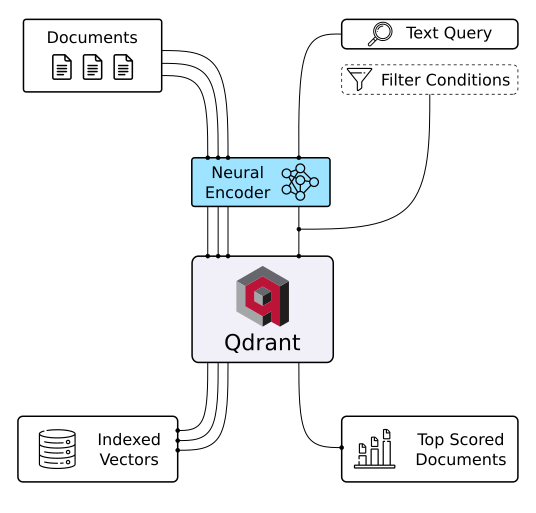
|
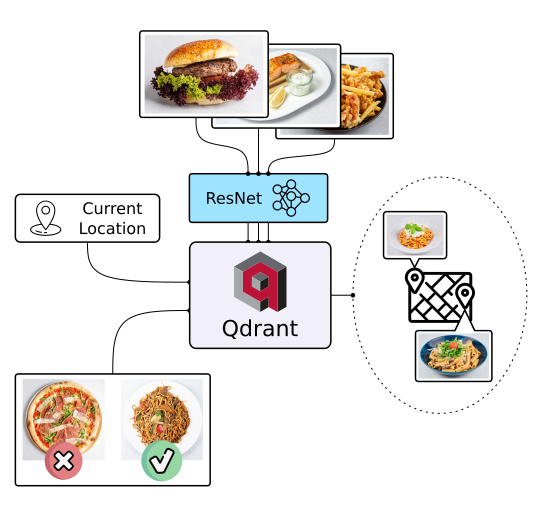
|
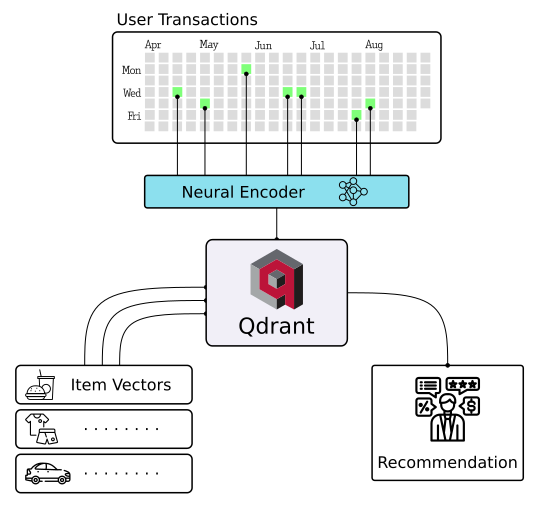
|
| Semantic Text Search | Similar Image Search | Recommendations |
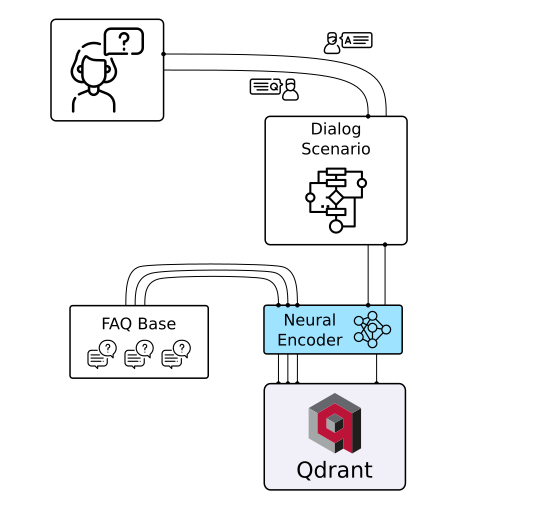
|
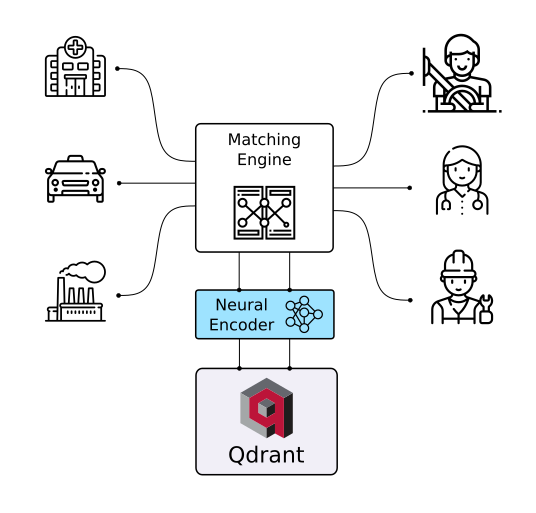
|

|
| Chat Bots | Matching Engines | Anomaly Detection |
API
REST
Online OpenAPI 3.0 documentation is available here. OpenAPI makes it easy to generate a client for virtually any framework or programming language.
You can also download raw OpenAPI definitions.
gRPC
For faster production-tier searches, Qdrant also provides a gRPC interface. You can find gRPC documentation here.
Features
Filtering and Payload
Qdrant enables JSON payloads to be associated with vectors, providing both storage and filtering based on payload values. It supports various combinations of should, must, and must_not conditions, ensuring retrieval of all relevant vectors unlike ElasticSearch post-filtering.
Rich Data Types
The vector payload accommodates diverse data types and query conditions, including string matching, numerical ranges, geo-locations, and more. These filtering conditions empower you to create custom business logic on top of similarity matching.
Query Planning and Payload Indexes
The query planner leverages stored payload information to optimize query execution. For instance, smaller search spaces limited by filters might benefit from full brute force over an index.
SIMD Hardware Acceleration
Utilizing modern CPU x86-x64 architectures, Qdrant delivers faster search performance on modern hardware.
Write-Ahead Logging
Qdrant ensures data persistence with update confirmation, even during power outages. The update journal stores all operations, enabling effortless reconstruction of the latest database state.
Distributed Deployment
As of v0.8.0, Qdrant supports distributed deployment. Multiple Qdrant machines form a cluster for horizontal scaling, coordinated through the Raft protocol.
Stand-alone
Qdrant operates independently, without reliance on external databases or orchestration controllers, simplifying configuration.
Integrations
Examples and/or documentation of Qdrant integrations:
- Cohere (blogpost on building a QA app with Cohere and Qdrant) - Use Cohere embeddings with Qdrant
- DocArray - Use Qdrant as a document store in DocArray
- LangChain (blogpost) - Use Qdrant as a memory backend for LangChain.
- LlamaIndex - Use Qdrant as a Vector Store with LlamaIndex.
- OpenAI - ChatGPT retrieval plugin - Use Qdrant as a memory backend for ChatGPT
- Microsoft Semantic Kernel - Use Qdrant as persistent memory with Semantic Kernel
Contacts
- Have questions? Join our Discord channel or mention @qdrant_engine on Twitter
- Want to stay in touch with latest releases? Subscribe to our Newsletters
- Looking for a managed cloud? Check pricing, need something personalised? We're at info@qdrant.tech
Contributors ✨
Thanks to the people who contributed to Qdrant:
License
Qdrant is licensed under the Apache License, Version 2.0. View a copy of the License file.



